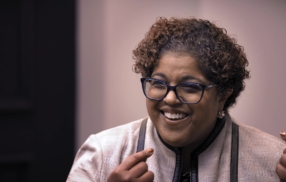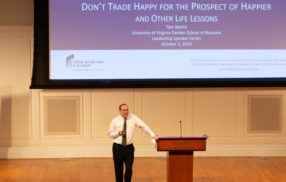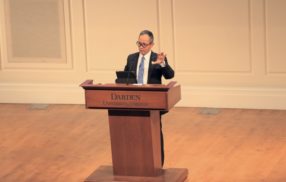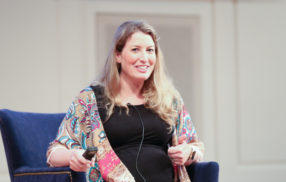‘Understand the Risk of Not Taking the Risk:’ Jean Case Kicks Off New UVA Darden Speaker Series With Pitch to ‘Be Fearless’
By Jay Hodgkins
Case Foundation CEO, National Geographic Society Chairman and internet pioneer Jean Case says she’s spent a lot of time in her career being some form of “the only one” in a room – be it as the only woman, child of a single parent or person without a college degree.
Like many who battle fear and insecurity about those labels, she said she ultimately learned that her different perspective was one of her most valuable advantages. More importantly, she also learned that it didn’t matter if she or any person was perceived as “the right person” with “the right circumstances” to pursue a big idea. Those who change the world with their ideas are more often than not ordinary people who are willing to be fearless and act.
That sentiment is the foundation of Case’s book, Be Fearless: 5 Principles for a Life of Breakthrough and Purpose, which she discussed with University of Virginia Darden School of Business Professor Mary Margaret Frank in the inaugural session of the new Leadership Unscripted speaker series, held 10 October at UVA Darden DC Metro in the Rosslyn district of Arlington, Virginia, in front of a packed house of Darden alumni, members of the business community, and students in the Rosslyn-based Executive MBA and Master of Science in business analytics programs.
Let Urgency Conquer Fear
Engaging Frank in a wide-ranging conversation that ranged from tips for entrepreneurs to challenges facing women founders to the importance of vulnerability and leveraging difference, Case began the discussion with a brief rundown of the five principles that shape Be Fearless.
- Make Big Bets, Make History
- Be Bold, Take Risks
- Make Failure Matter
- Reach Beyond Your Bubble
- Let Urgency Conquer Fear
The five principles, she says, are those she practiced in her rise from humble roots in the aptly named Normal, Illinois, and that her research proved were practiced by successful entrepreneurs across all walks of life and corners of the globe. She was driven to write the book because, too often, her work connected her with people who had incredible ideas but were convinced they weren’t the right person to bring them to life. Seeking to empower those very people, she discovered a common formula.
The key ingredients: action; overcoming fear; a willingness to experiment, fail and change course; remaining intentional; and being driven by urgency.
“Let urgency conquer fear is my favorite principle,” Case said. “Or as Martin Luther King Jr. said it, ‘the fierce urgency of now.’”
While it’s natural for people to love comfort zones, Case said, staying in a comfort zone mutes the urgency required to take the risks needed to realize a big idea.
Flipping the Script on ‘Managing Risk’
Frank, a professor in Darden’s Accounting area, said the world of board audit committees and managing risk was central to the mindset of many in business. Case agreed, and said that even worse, the language often revolves around “mitigating risk,” which automatically frames the conversation in the context of risk avoidance.
Instead, she asked attendees in the room and leaders everywhere to consider: “What’s the risk of not taking the risk?”
Take the case of Blockbuster and Netflix. Netflix, Case said, once tried to sell itself to Blockbuster – the dominant player in video rental – for $50 million. But Blockbuster didn’t consider the risk of disruption seriously enough. Today, Netflix is valued at $120 billion and Blockbuster has one brick-and-mortar store left in Bend, Oregon.
Other examples Case referenced included Kodak, which actually pioneered digital photography, but eschewed its own innovation due to a culture so heavily invested in film. She mused that what the world once knew as picture-worthy “Kodak moments” are now “Gram-worthy” to a billion Instagram users.
Case even referenced the tightrope once walked by the organization she serves as chairman, National Geographic Society. The board of the 131-year old organization, then overseeing what it deemed a serious scientific journal, rejected the idea of using the new technology of photography to enhance the journal. Fortunately, she said, National Geographic’s then-president Andrew Graham Bell fought for the idea, leading to the departure of two board members but setting the organization’s course for a future in which National Geographic is synonymous with incredible photography.
“We’re more relevant today in societies across the world than ever,” she said.
Being Fearless, Being a Woman and the Challenge of Combining the Two
Case lamented a societal construct and unconscious biases that constantly reinforce women being quiet and demure, from instances of mothers allowing their boys to be rambunctious while chastising daughters for the same behavior to women adopting a practiced meekness in public to avoid unwanted advances. She also called out structural inequalities, such as the paucity of women on corporate boards and the fact that only 2.2 percent of venture capital funding last year went to ventures founded by women.
However, the lack of representation for women in the entrepreneurship and innovation space can actually be used as an advantage, Case said. By virtue of being different, women can bring unique perspectives that unlock the potential of big ideas, be it in the boardroom or a startup in a garage.
“If you are a woman and feeling alone, think about how you might be bringing the special ingredient by being who you are,” Case said.
For women or anyone who might feel out of place, a key to leveraging difference is taking the risk of being vulnerable. Case said that asking a question in a room of experts instead of pretending to understand might just introduce a new perspective, and with it the potential for better answers.
That sentiment, Frank said, was on point for Darden grads and students in the room, who experienced the Darden case method and classroom where “the question you ask can be far more powerful than the answer you give.”
Watch Jean Case Discuss the Power of Leveraging Difference
Watch more highlights of the Leadership Unscripted discussion with Jean Case on Darden Ideas to Action.
The University of Virginia Darden School of Business prepares responsible global leaders through unparalleled transformational learning experiences. Darden’s graduate degree programs (MBA, MSBA and Ph.D.) and Executive Education & Lifelong Learning programs offered by the Darden School Foundation set the stage for a lifetime of career advancement and impact. Darden’s top-ranked faculty, renowned for teaching excellence, inspires and shapes modern business leadership worldwide through research, thought leadership and business publishing. Darden has Grounds in Charlottesville, Virginia, and the Washington, D.C., area and a global community that includes 18,000 alumni in 90 countries. Darden was established in 1955 at the University of Virginia, a top public university founded by Thomas Jefferson in 1819 in Charlottesville, Virginia.
Press Contact
Molly Mitchell
Senior Associate Director, Editorial and Media Relations
Darden School of Business
University of Virginia
MitchellM@darden.virginia.edu







